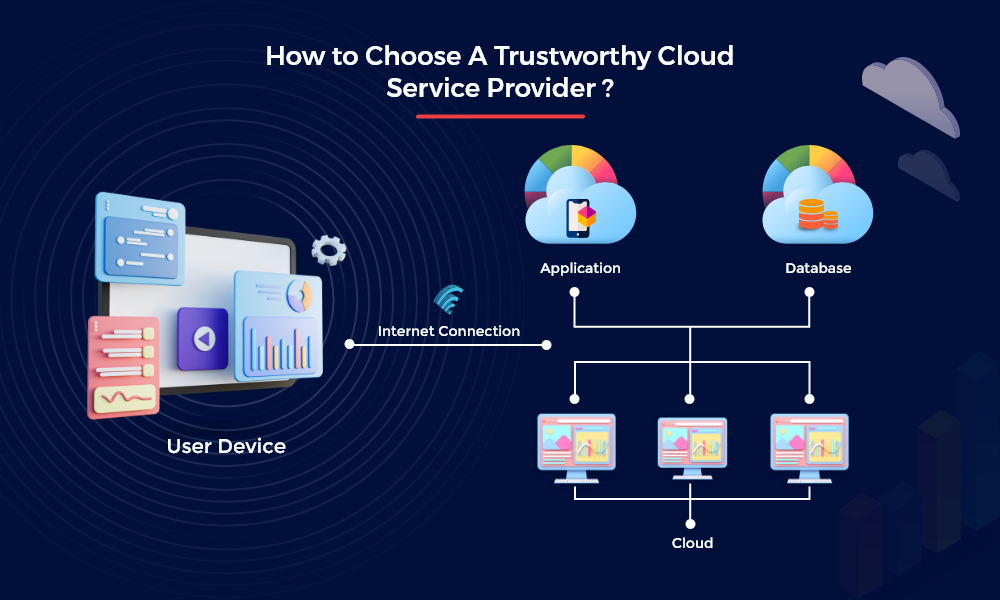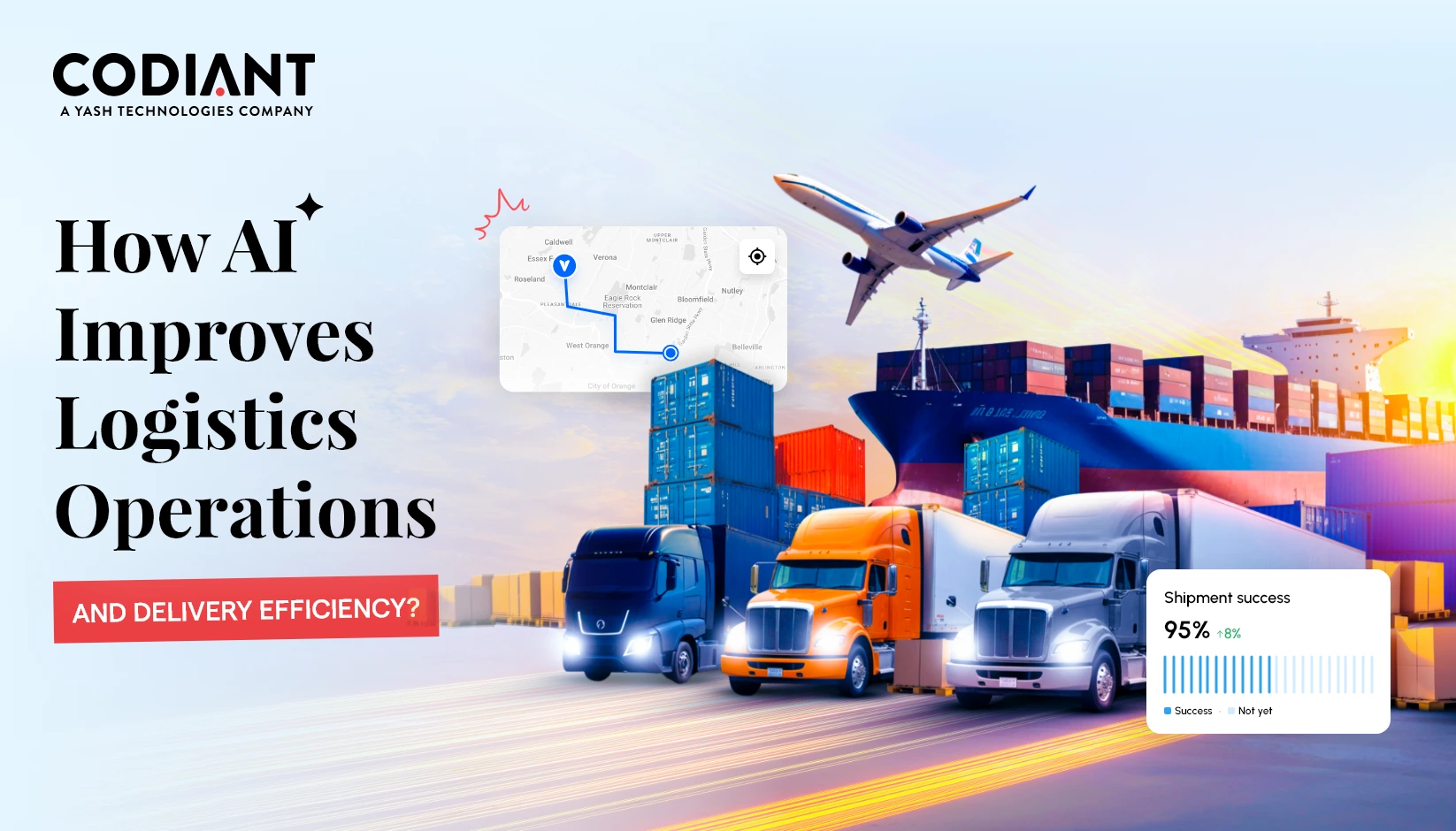How to Choose A Trustworthy Cloud Service Provider?
Table of Contents
Subscribe To Our Newsletter

In the breakneck world, cloud service providers have eliminated the need for hardware to operate any website or application.
There are a number of small to large scale businesses that are moving to cloud services. The businesses have very well analyzed the ability of cloud platforms, its benefits, and adopted it with open arms.
In a period of decade, cloud computing services have lured the attention of the whole tech market for the sake of remote data access and multi-user facilities.
As a matter of fact, the demand and requirements of each business is different and each business is unique in its own self, so not all solution providers can adjust into a same size frame.
As a tech company, we very well understand all these concerns and always do our best to help our clients in resolving such issues. That said, if you feel stuck somewhere over making the decision to choose a suitable and trustworthy cloud service provider, then you can find most of your answers here.
We have distilled the key factors that can help you to understand your business needs and choose the right cloud service provider accordingly. Let’s delve into it.
What is Cloud Computing?

Cloud Computing is an on-demand service that enables devices of clients to access data and cloud applications with the help of internet service from remote physical servers and databases.
In cloud computing, companies don’t have to build their database server, rather they can simply purchase a storage space on cloud and save all the details over there. Then the user can access the relevant data at any time of the day. The internet connection links the front-end (browser, client device, network and cloud software applications) to back-end (database, server, and computers). The centralized server only communicates with the front-end and back-end devices. Typically, each application or workload has a dedicated server.
Cloud Computing is usually preferred among businesses and individual users due to a number of reasons, it includes minimum hardware and software expenses, increases productivity, performance, high data security, and quick and efficient.
What is a Cloud Service?
The term ‘cloud service’ stands for the delivery of wide range of on-demand services to companies and customer with the support of internet service. The services can also be used for professional services that support the selection, deployment, and continuous management of different cloud-based resources.
Cloud services can be properly managed by cloud computing service providers and vendors. Customers can access the data from servers, so the companies don’t require to host the application in its on-premises servers.
The cloud service is designed to deliver easy, quick, and affordable access to data or applications without requiring any personal infrastructure or hardware.
For instance, checking email to access any document, people or employees prefer cloud services to access data instantly and at any location with internet connectivity.
What is a Cloud Service Provider?
A Cloud Service Provider is a third-party company or an agency that offers components of cloud computing i.e. infrastructure, cloud-based platforms, and storage to its clients. Cloud Services allows its clients to only pay for what they need/use.
There are 3 types of Cloud Service Providers, it includes IaaS (Infrastructure as a Service), SaaS (Software as a Service), and PaaS (Platform as a Service).

- Infrastructure as a Service (IaaS)IaaS is the origin of cloud computing, where the infrastructure components are delivered that exist in on-premises data center. The web services comprise of database, personal digital servers, storage, and additional on-demand services. The user is charged on the basis of storage space used.
- Software as a Service (SaaS)SaaS providers offer a diverse range of business technologies, like CRM (Customer Relationship Management) software, HRM (Human Resource Management) software, Data Management Software, Productivity suite, all such services that a vendor can host and provide through the internet. SaaS is the cheapest way to migrate to cloud, and it requires third party support to customize and implement services as the size of the business.
- Platform as a Service (PaaS)PaaS offers cloud infrastructure and services for users to access and perform relevant functions. It is commonly preferred in the software development process. Under this service, the clouds are centralized on a network, and don’t hold any control over its infrastructure.
How to Choose A Trustworthy Cloud Service Provider?
- Cloud Security Data is the lifeline of any business, so data security remains the major concern for any business. For that, businesses usually implement plenty of security measures to preserve their customers’ valuable data and applications. To get all such services at a place cloud service is the most suitable option.The user doesn’t have to pay any additional charges to define the level of security they require for their business. It is like a shared responsibility between the customer and the cloud service provider. The high-level security authentication access is applied to filter the traffic and configure the accurate needs of the business. All these authentication rules can be configured and managed centrally, which minimizes the overhead cost and allow IT teams to focus on other business areas.
- Cloud Compliance Research thoroughly while selecting cloud service providers that support you to meet compliance standards that are applicable in respective business industries. Every industry has different norms and regulatory compliance, such as HIPAA, GDPR, or ISO.Each regulation has different requirements, breach response, and reporting. So, analyze where your responsibilities lie, and check off the compliance aspects with the service provider. As a matter of fact, some industrial regulation forbade to store, process, or transfer the customer data to cloud platforms whose data storage ability is confined under geographical boundaries or have some specific requirements for data protection, access authority, or data confidentiality.
- Contracts and SLAs Before finalizing the cloud architecture provider carefully review the contracts and SLAs, if required go for amendments as well. It can build a transparent and healthy contractual relationship between the customer/client and the cloud service provider.Therefore, a guided and focused approach should be attempted over legal requirements for the hosted data security, especially under GDPR regulation. In addition to that, make sure the SLA includes the exit or penalty clause, if assured services are in vain or not delivered.
- Architecture Cloud Computing Architecture is a combination of multiple components that are required to provide Cloud Computing Services. The different components include a front-end platform, a back-end platform, internet connection, and a cloud-based service delivery. The front-end of cloud-computing consists of clients’ part, whereas the back-end part consists of a database server or cloud itself. A database server or cloud comprises of virtual machines, security mechanism, data storage, servers, etc.So, while selecting the cloud service provider, analyze how their cloud architecture can go with your business workflow, while considering businesses ongoing and future perspective both. For instance, an organization has already invested a lot in Microsoft tools then, can go with Microsoft Azure. It will streamline your business process and workflow.
- Cost Cost is one of the major concerns for any business decision making to choose a cloud service provider. Initially, you can go with a pay-as-use option where you can find multiple storage options, with discounts and offers occasionally.In contrast to this, a low-cost cloud service offering might be tempting to grab your attention, but you do not always get what you see. So, choose wisely and verify every detail, if needed go for bargaining or ask for some special discounts and offers.Generally, you can get to explore three different ways to purchase on cloud service platform, which are as follows;
- Pay-as-you-Go: Pay the amount for the size of data storage space used, no upfront cost to pay.
- Reserved: Purchase and reserve a definite size of storage space for a period of year (whatever time duration suits you), with an upfront cost based on storage space.
- Volume Discounts: Acquire multiple services from the same service provider as your company grows, and as a result you can relish additional discounts for specific services.
- Technologies and Support The suitable cloud platform should work in a streamlined manner with your business standards, architecture, and services to align workload, management, and technical environment.While shifting from traditional server to the cloud platform, data migration is the most complicated aspect and for that businesses require expert assistance.Examine if the cloud service provider extends proper support and technicalities to smooth the data migration process. Most of the cloud service providers have tool assessment to help in migration that support server, database, or application migration.
- Backup and Disaster Recovery Cloud Service Platforms can also be used as an alternate backup plan to keep their data safe from any type of disaster, natural calamity, power failure, etc. Like this, the organizations can keep their data safe from unforeseen natural and unnatural threats.The cloud services also keep the backup of your data, to be doubly-assure. In that reference, analyze how frequently the cloud service provider takes the data backup. As there is no point in being associated with such a service provider that is not at least backing up the data once a day. There are service providers that keep the backup of data for 45 days, and can extend the duration if a request is raised.
- Reliability Study and analyze the past performances of the cloud service providers during the past few years to measure their reliability. Check out the points from where the service provider can handle both planned and unplanned downtime.It could be a crucial aspect to get into the depth to check to what extent the data recovery and data backup can be possible during the unplanned situations.Well, you can’t expect perfection, as downtime is inevitable and every cloud provider faces such circumstances at some point. But what matters the most is how the service provider tackles such situations or how much preparation/preventive measures have been taken in advance.
Top Cloud Computing Platforms

- Microsoft Azure
- Amazon Web Services
- Google Cloud
- IBM Cloud
- CloudLinux
- Hadoop
- com
Related Reading: AWS Vs. Azure: Which Cloud Platform Is Best
Conclusion
Choosing a right and trustworthy Cloud Service Provider is not a choice, rather it is a necessity for any business. Businesses always seek highly secured, round-the-clock support with quick resolution as a cloud service provider but at an affordable rate.
In all such aspects, Codiant can guide you accurately in the process of cloud service selection, which can appropriately serve all your business requirements.
We have a team of cloud solution providers and data migration, that can understand your business workflow and monitor the data migration to cloud with utter precision.
In addition to that, you can also reach out to our expert business associates, who can help you to design a solution to enhance your data security, scalability, flexibility, and all in a cost-effective way.
Featured Blogs
Read our thoughts and insights on the latest tech and business trends
How to Choose the Right AI Development Partner in the USA (Enterprise Guide 2026)
- February 12, 2026
- Artificial Intelligence
In a Nutshell Enterprise AI success starts with clear business goals, not vague plans like “we need AI.” The best AI development partners deliver real production systems, not just impressive demos or prototypes. Industry alignment... Read more
How AI Is Transforming Transport & Logistics Operations in Real Time
- February 10, 2026
- Artificial Intelligence Logistics & Transportation
In a Nutshell: AI in transport & logistics is enabling faster, smarter decision-making across fleets, warehouses, and supply chains. Real-time logistics optimization improves route planning, dispatching, and delivery efficiency as conditions change. AI-driven forecasting and... Read more
How Much Does It Cost to Hire a Dedicated Developer in 2026?
- February 6, 2026
- Staff Augmentation
In 2026, hiring software developers is a substantially different process than it was just a few years ago. Remote work has become the norm and businesses are no longer limited to hiring talent in their... Read more




